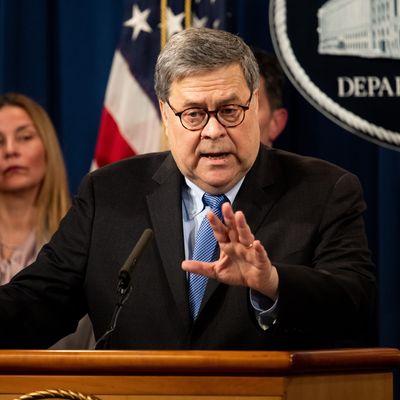
In a press conference on Monday, Attorney General William Barr criticized Apple for not providing “substantive assistance” with an investigation into last month’s mass shooting in Pensacola, Florida. The comments are the latest escalation in a dispute between the government and tech companies over the strong security used on devices like iPhones. They echo a dispute from four years ago in which Apple also found itself at odds with a federal investigation.
On December 6, Mohammed Saeed Alshamrani killed three sailors and wounded eight others. Alshamrani was a Saudi Air Force cadet training with the American military. According to the New York Times, he had “posted other anti-American, anti-Israeli, and jihadist social-media messages, some within hours of attacking the base.”
The shooter also used an iPhone, and Barr wants Apple to help him unlock it and access its contents. Apple, however, does not want to do that, because building a tool that can be used at will for breaking into iPhones basically makes the company’s security worthless. For high-profile cases deemed acts of terrorism, this stance puts it in a precarious position.
Apple does assist with law-enforcement investigations, turning over any data the company has in its possession, which usually means iCloud data stored on Apple’s servers. For instance, if you back up your iPhone to the cloud, Apple might turn over that backup.
Unlocking devices is a different story, however. In the wake of the 2016 San Bernardino shooting, the FBI sued Apple to try to compel the company to create a tool that would let it bypass a phone’s lock screen (the case cited the All Writs Act of 1789, which I have to believe was not crafted with computer-based encryption in mind). Apple refused, and CEO Tim Cook wrote an open letter that boils down to this: If we break security on one phone, we would be breaking security on all of our phones. “The implications of the government’s demands are chilling,” he wrote. “If the government can use the All Writs Act to make it easier to unlock your iPhone, it would have the power to reach into anyone’s device to capture their data.”
Until the FBI found a third-party tool that allowed investigators to access the shooter’s phone, the case seemed headed for the Supreme Court. The FBI was arguing that, if Apple refused to bypass the iPhone’s security measures, the company was possibly abetting terrorism. But if Apple did provide access, it would have made all of the company’s claims about its devices’ security worthless (and Apple cares a lot about selling those devices). The lawsuit also had substantial First Amendment implications: If the government compels the creation of certain computer code, is that the same as compelling a certain type of speech?
It now looks as if Apple and the federal government are headed for another legal battle, though it will take place in a notably different legal landscape than that of early 2016. There are a new president and new attorney general, and the makeup of the Supreme Court has shifted. Whatever happens with Apple’s encryption fight will also ripple throughout the tech industry. Last year, Facebook announced plans to eventually encrypt all of its messaging services, making messages readable only by their senders and recipients. “The future is private,” Mark Zuckerberg declared. In 2016, the other major tech players, like Google and Microsoft, backed Apple. Yesterday, Microsoft CEO Satya Nadella declined to talk about the specifics of the Apple case but did tell reporters that “back doors [for law enforcement] are a terrible idea.”




























